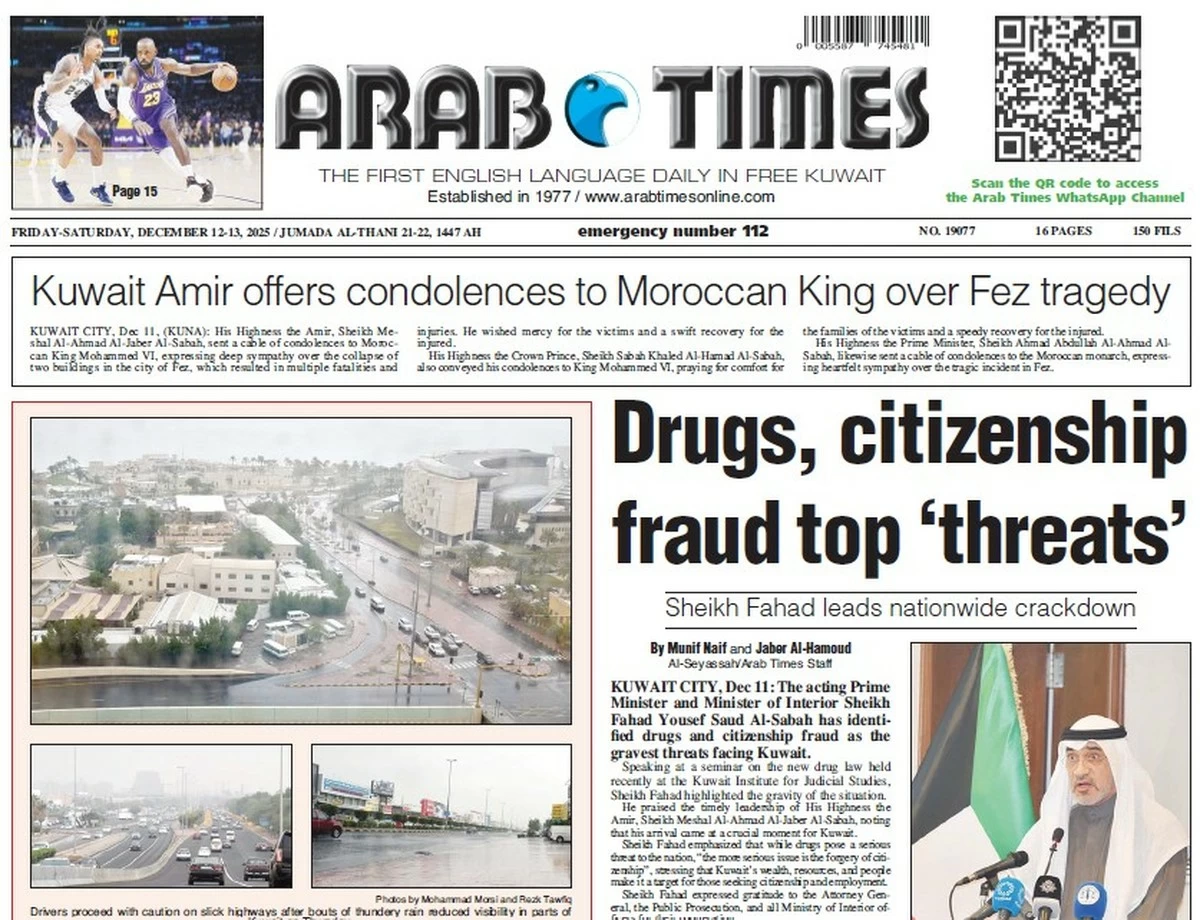27/12/2021
27/12/2021
IMAGINE what would have happened to Kuwait if the late Sheikh Jaber Al-Ahmad and the late Sheikh Saad Al-Abdullah did not seek refuge in Saudi Arabia on August 2, 1990, and the invasion forces were able to capture them!
Undoubtedly, Saddam Hussein would have forced them to sign a federation agreement with Iraq, followed by the annexation of Kuwait and the fall of legitimacy. Can you imagine that?
The focus of this article is the symbolism and prestige of the ruling family, which has a particularity that must be preserved. In monarchies all over the world, there are laws, customs and traditions that regulate the affairs of these families. No one can deviate from them, and also the arrangement of assumption of power, as is the case in Britain, Sweden, Norway, Morocco, and the Arabian Gulf states.
The reason for this is to maintain the continuity and stability of the state, which derives from that symbolism and legitimacy. For this reason, countries have allocated funds for the ruling families so that its members do not compete with the rest of the people in businesses, and they stay away from suspicions so that they do not become subject to trials.
In fact, in several countries, there are ruling family councils that supervise and discipline the ruling family members who misbehave by sending them to private prisons. This is what happened in the Kingdom of Saudi Arabia, as well as in the UAE. We all know how the late Sheikh Zayed bin Sultan Al-Nahyan disciplined two of his sons when their behavior fell short of the required standards when dealing with ordinary citizens.
In some countries, there are special schools for the ruling family members, as is the case with the Mawlawi Institute in Morocco. Here, the king chooses the top performing students from all schools of the kingdom to study with his children and grandchildren. To add to this is the school for royals in Saudi Arabia, and other countries where these children are prepared to handle the affairs of the state in the future.
The sons of the royal families stay far from any recriminations. However, in many countries, they are prohibited from participating in the election of members of Parliament. None of them hold a ministerial position, so that they are not subject to accountability, as it could undoubtedly harm the prestige of the ruling family.
In Kuwait, after the Constitution was robbed of the privileges of the members of the ruling family, they have been in a limbo.
Almost every sheikh from the ruling family is out in the open because interference in its affairs began years ago through parliamentary political shortsightedness, miserliness and greed.
During the era of the late Sheikh Jaber Al-Ahmad, the royal fund amounted to KD 10 million, but because of campaigns launched by some members of the National Assembly and the envious, the late Amir reduced the fund to KD 8 million. That move had an impact on the support provided to ruling family members.
Also, with the large number of parliamentary interventions concerning the allocations of the Amiri Diwan, we have reached a stage where we see some sheikhs being imprisoned because of corruption resulting from financial need, which has led to the weakening of the family’s prestige.
In many monarchies, we have neither heard of anyone complaining about a sheikh or a prince, nor any of them being imprisoned. This is because there is a law that has preserved the prestige of these families, and sufficient financial allocations to prevent any of them from falling under the pressure of temptations.
In Britain, one of the royals was stripped of his title because he wanted to break the custom. The same happened with the grandson of Queen Elizabeth. He was stripped of all titles and privileges due to his desire to live outside the framework of the monarch’s traditions.
Preserving the prestige of the ruling family happens by keeping its members away from commercial work and increasing their royal allocations.
Kuwait is a rich country, and its income is in the billions. It does not prevent part of that income from being allocated to the ruling family, even if it is a billion, in order to maintain its position and ensure that prestige is preserved, which is the source of stability and continuity.
All of this is done through financial sufficiency first, then good preparation of the ruling family members, so that the selection of personalities who are able to take important and sensitive executive positions will be successful, not for any of them to depend on a legacy or prestige, which would lead to his failure and then cause him to become subjected to criticism and accountability to the extent that his dignity would be insulted in social media or the media.
There are many examples in the Arab world where the weak prestige of the ruling family, the spread of corruption among its members due to the need for money, greed and envy, and the lack of good academic preparation of future rulers, have led to revolutions that overthrew the monarch. This happened in Egypt, Iraq, Libya and Yemen, but the people there are now lamenting the fall of their monarchs, as the latter were a source of stability, development and progress.
By Ahmed Al-Jarallah
Editor-in-Chief, the Arab Times


